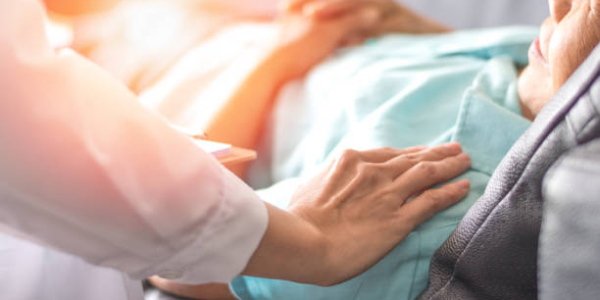When a patient receiving hospice care dies at home, family and caregivers should not call 911 or emergency services.
If you believe your loved one has died, call your hospice provider at the 24-hour call center number. A team member will come to confirm the death and assist with final arrangements.
Final arrangements
The hospice staff knows how to help when a patient dies at home. They can:
- Call the funeral home or assist with finding a funeral home if one has not been selected. State laws governing the required use of funeral homes vary, but most families choose a funeral service (mortuary) professional to take care of the body.
- Prepare the body for transportation to the funeral home and, if possible, stay with the family until funeral home staff arrive. It is normal for families or loved ones to want to spend time with the deceased person. Mortuary services will pick up the body when loved ones are ready. State laws vary as to how quickly the body must be retrieved.
- Assist with telephone calls to relatives and friends.
- Arrange for removal of durable medical equipment supplied by the hospice provider, such as a hospital bed or oxygen compressor.
- Dispose of medications. (This is a federal requirement.)
- Arrange to remove personal hygiene supplies. Hospice providers usually do not accept unused personal supplies such as incontinence pads, but charities like Goodwill or the Salvation Army may accept unopened packages.
Death certificate
A death certificate is an official document that declares the cause and location of a death.
When a patient dies in hospice care, the hospice nurse will confirm the death and complete the legal paperwork required. The hospice provider will submit the paperwork to the relevant vital records office so a death certificate can be issued.
Death certificates also may be available through the funeral director.
Obtaining a death certificate may take several days or longer, depending on state laws.
Bereavement support
Grief support is offered to bereaved family members and the patient’s intimate network for up to 13 months after the death. The hospice care team may provide information on how to access this benefit immediately or follow up with the family several days after the death.
Other matters
After a death, many personal and legal matters may need to be taken care of, such as:
- Writing an obituary. The family may want to publish an obituary to memorialize their loved one. Many funeral homes offer assistance with writing an obituary and will post it online. A number of websites give helpful advice; for example, Grammarly.com provides a step-by-step guide for how to write an obituary.
- Handling finances, insurance, wills, and credit cards. AARP provides a useful list to assist those who are now responsible for handling practical and financial matters. It explains what to do in the days and weeks after a death, including how many copies of the death certificate you will need and what to do about life insurance, bank accounts, wills, and credit cards. Read more about preparing for imminent death here.
Notifying Social Security. It is important to notify the Social Security Administration (SSA) when a person dies. Social Security survivor benefits are paid to widows, widowers, and dependents of eligible workers. This benefit is particularly important for young families with children. The SSA website provides detailed information about survivor benefits.


